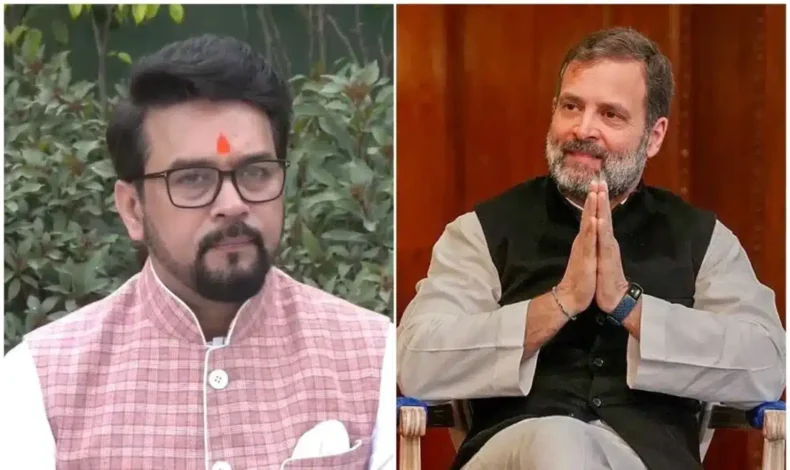Union Minister Anurag Thakur has launched a scathing attack on Rahul Gandhi, a senior member of the Indian National Congress, over recent comments made by Gandhi during his visit to the United Kingdom. Thakur criticized Gandhi for his “unfortunate” remarks about the Indian democracy and accused him of insulting the House of which he is a member.
The controversy began after a viral clip of Gandhi saying, “Unfortunately, I am a member of Parliament…” led to a press conference where he explained that he would first speak in the Lok Sabha on the matter before addressing the media. He also requested the Lok Sabha speaker Om Birla to allow him to speak in the House about the allegations made against him.
Thakur, who is also the Union Minister for Information and Broadcasting, criticized Gandhi’s low attendance in the Parliament and linked it to his poor understanding of how the House works. He even offered to give Gandhi a booklet of the House rules to help him better understand the functioning of the Parliament.
Thakur’s attack has sparked a war of words between the Bharatiya Janata Party (BJP) and the Congress, with each side accusing the other of spreading misinformation and engaging in dirty politics. In his attack on Gandhi, Thakur also alleged that Gandhi is accustomed to telling lies and that his name, Rahul, is an acronym for “Regretful, Awful, Hateful, Ungrateful, Liar”. This attack has further heightened tensions between the two parties.Thakur also criticized the Gandhi
family’s sense of entitlement and asked if they considered themselves greater than the country. He demanded an unconditional apology from the Congress leader for insulting the Parliament and the country from a foreign land.
The controversy has disrupted the proceedings of the second leg of Parliament’s Budget session, with both the BJP and the Opposition remaining steadfast in their demands. While the BJP is seeking Gandhi’s apology for his remarks, the Opposition is insisting on a joint parliamentary probe into the Adani crisis. The Adani crisis relates to the allegations made by the Congress party that the Adani Group, a conglomerate with interests in several sectors, received undue benefits from the government. The BJP has denied the allegations and accused the Congress party of trying to defame the government and the Adani Group.
As the political row continues, the fate of the ongoing Parliament session remains uncertain. With both sides refusing to budge from their demands, it remains to be seen if a compromise can be reached to allow the session to proceed smoothly. This controversy has sparked concerns about the state of Indian politics and the ability of its leaders to work together for the benefit of the country. The ongoing standoff highlights the deep divisions within the political landscape of India, and it raises questions about the country’s ability to effectively address its pressing issues. The controversy has also drawn attention to the issue of attendance in the Parliament, with several lawmakers being criticized for their low attendance. The Lok Sabha speaker Om Birla recently expressed his concern over the issue and urged lawmakers to attend the sessions regularly. The ongoing controversy has also raised concerns about the state of Indian democracy and the need for robust opposition to hold the government accountable. With the BJP holding a majority in the Parliament, there are concerns that the opposition’s voice may not be heard effectively. The controversy has also highlighted the need for a constructive and respectful dialogue between the ruling and opposition parties. The political climate in India has been increasingly polarized in recent years, and the ongoing controversy has further exacerbated the situation. As the political row continues, it remains to be seen how it will affect the upcoming assembly elections in several states. The controversy has already dominated the news cycle and has become a major issue in the political discourse in the country. The situation remains tense, and it remains to be seen whether a resolution can be reached that satisfies both sides. Nevertheless, this episode highlights the importance of upholding the dignity of Parliament and the need for responsible discourse in public life.












